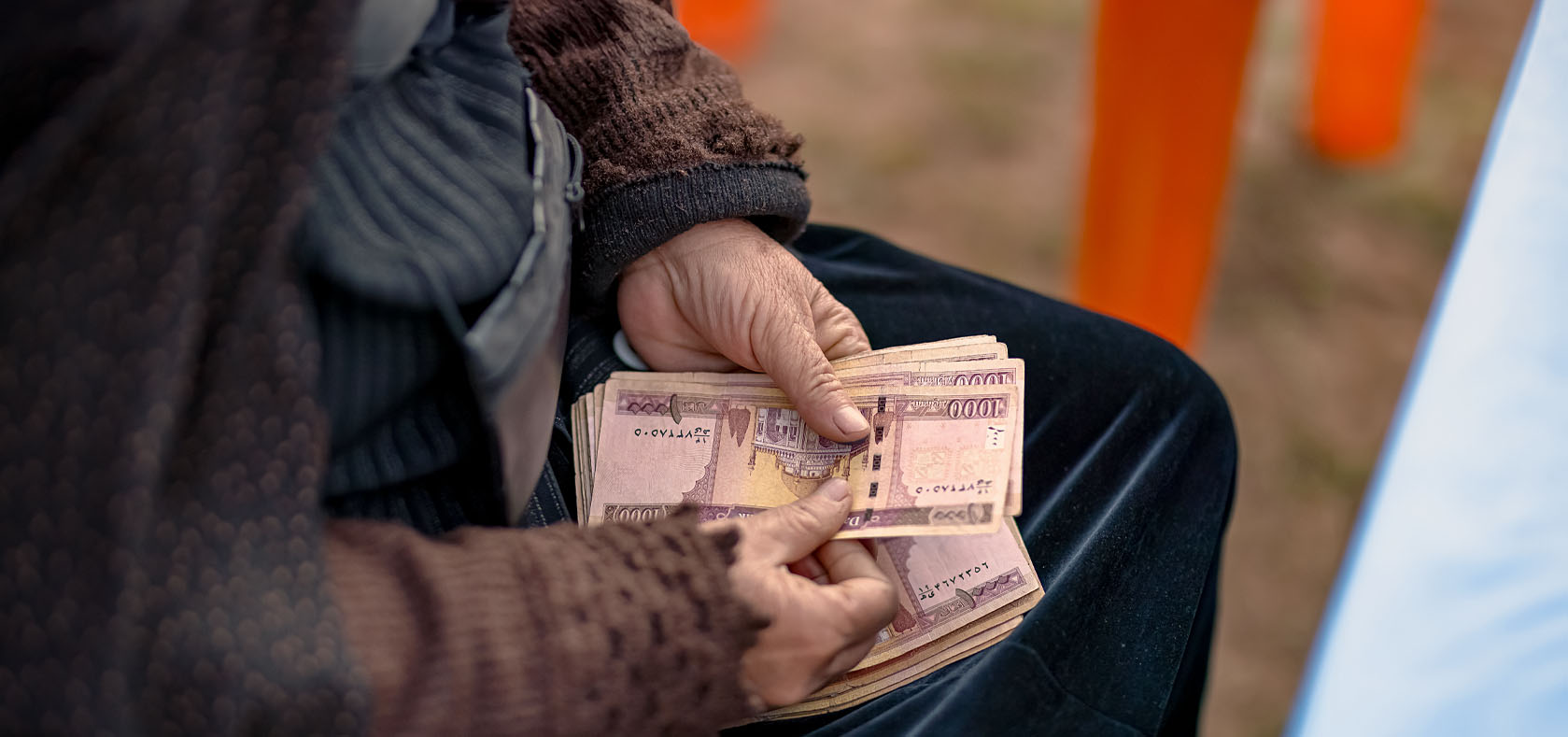Cash assistance enables Afghan women to weather the harsh winter
Date:

Ornate multicoloured mosques stand in sharp contrast against the barren, snow-capped mountains in Afghanistan’s northern Balkh Province. While summers here are sweltering, winters can be brutal, with freezing temperatures at night. Here, where many households cannot afford heating due to rampant poverty, winter is a time to be dreaded.
Women-led households are particularly vulnerable, as the Taliban have restricted sectors wherewomen have access to paid work, and women and girls disproportionately suffer from malnutrition and anaemia, making it harder to withstand cold temperatures.
“My daughter always has a headache. I took her to the clinic several times, and they say she has low blood and is not properly nourished,” says Noorya,* a widow with six children. “We lacked sufficient food and clothing. My children wore old clothes we got from people, and those clothes are now torn. … In a good month, I don’t earn more than 7,000 afghanis, which is enough for food, nothing else.”
She is among the nearly 12,000 beneficiaries and 1,338 households (1,225 of which are women-headed households) that UN Women has supported with cash assistance in 62 districts in seven provinces so they could buy clothing, fuel and other supplies to help them withstand the frigid winter. This assistance is funded with support from the Governments of Austria, Norway and Sweden.
For Noorya, it meant her children could finally get some new clothing and would no longer have to go scrounging for animal dung to heat the basement of the house where they’re currently living.
Shazia,* a 26-year-old university graduate and widow with four children from Balkh Province, was facing similar challenges.
“After my husband’s death, we are living with my father, whose economic situation is not good enough to afford education for my children,” says Shazia. “Last winter was challenging as I had no fuel for heating or warm clothes for my children. However, this year, thanks to the assistance from UN Women, I am grateful to be able to purchase winter fuel, warm clothes for my children, and some food items.”
Besides widows, the women receiving assistance included those most marginalized and vulnerable, a quarter of whom are women with disabilities, a quarter of whom are internally displaced and another quarter of whom are Afghan migrants recently evicted from Pakistan.
Atefa*, 22, was one of them. “My husband used to work in a brick kiln in Pakistan, and despite being immigrants, we had a decent life. … Five months ago, my husband was falsely accused of theft and imprisoned. I exhausted all our resources to prove his innocence, but we didn’t succeed. … A month ago, the Pakistani Government warned all Afghan immigrants to leave the country. We were among those expelled.”
Two weeks after being deported to Afghanistan, her husband was still in prison in Pakistan. Atefa came to Balkh Province with her three children, with nothing but the clothing on their backs, eventually finding a house she could only afford to rent by begging.
“Everything I had in Pakistan was spent on the struggle for my husband’s freedom. When we were expelled, I had nothing from home to bring with me, and now, after two weeks, I don’t have any household items or clothing. We don’t have food for ourselves or warm clothes for my children,” says Atefa.
She expressed her gratitude for the financial assistance provided by UN Women to procure winter fuel and food for the displaced, which she says allowed her to buy coal, warm clothes for her children and essential food items, like flour, rice and oil for the winter.
In neighbouring Jawzjan Province, Shahnaz* was living with her son, who has a disability and needs treatment. "Our house was too cold in the winter, and we could not afford to provide heating. With UN Women support, I provided food and heating for my family and bought the medicine my son needed, and his situation is improving.”
Meanwhile, Sumaia*, whose husband is unemployed, says they would not have been able to buy winter clothing for their family had it not been for UN Women's cash support, which also enabled her to buy some food. Cash assistance gives women more financial autonomy and flexibility to buy what they need to keep their families warm.
“Women are often the primary caregivers in their families and cash assistance allows them to meet the immediate needs of their children and dependents. Cash assistance also empowers women to make their own financial decisions and manage their own resources, which can build their confidence and independence,” says Alison Davidian, Special Representative for UN Women Afghanistan.
Crisis-affected women are also benefiting from UN Women and partners’ resilience programming, which builds women’s economic empowerment, vocational and business skills, while supporting survivors of gender-based violence.
* Names changed to protect the women’s identity.